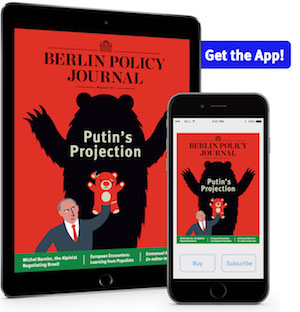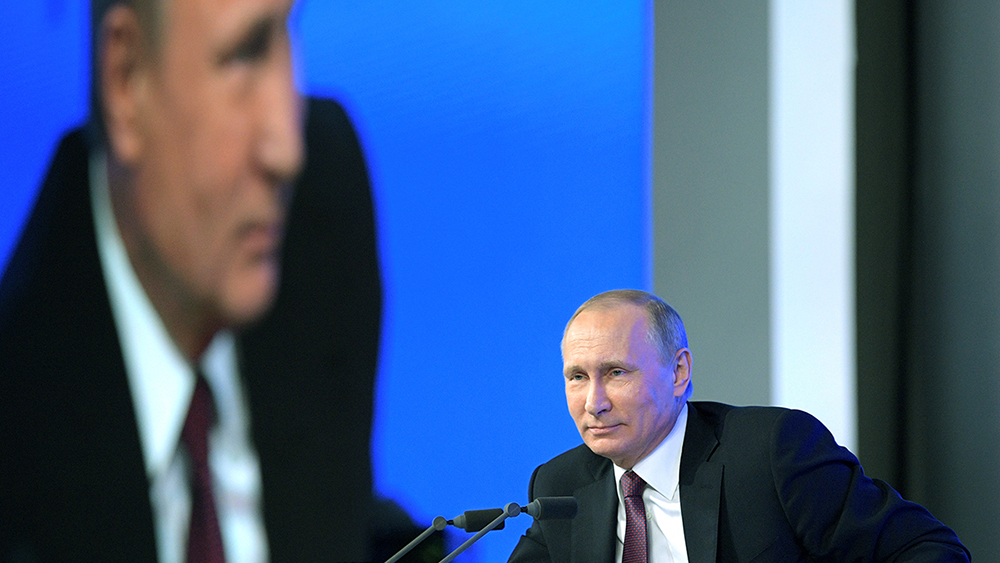Vladimir Putin’s Russia may strike fear in the hearts of Europe and beyond, but much of what we see as strength is rooted in weakness. The West should be careful not to make it stronger than it is.
Years after the Soviet Union collapsed, Russia still was considered a second-tier power and a paradigm of inefficiency: corrupt, authoritarian, its economy dependent upon high energy prices. Until President Vladimir Putin, that is: he turned his country’s soft power deficit into strength.
At home, his government systematically clamped down on media and internet freedom, curtailed the work of NGOs, and unleashed security forces on protests. Abroad, the Kremlin used its foreign news outlets and social media to sow fear and unease by creating the impression that it could manipulate European societies. In doing so, Russia was bypassing EU leaders and directly addressing their people – a lesson learned from the West.
This is Putin’s real strength: He is not intimidated by the West’s economic or technological superiority. He shrewdly analyzes and learns from his opponents, just as he was taught to do as a Soviet intelligence agent. Unlike many of his peers in Europe, Putin sees the world as it is, not as he would like it to be (like many Western leaders do). He recognizes his own weaknesses and those of his opponent, and time and again he proved able to turn an apparent defeat into a victory.
His stubborn ability to surprise opponents and unscrupulously exploit their vulnerabilities has won him considerable gains. He has been able to push through significant projects, like the 2008 military reform, and to optimally use the limited resources of a corrupt, inefficient state. The military operations in Crimea and Syria also showed the Russian army’s astonishing progress in speed, communication, discipline, and equipment.
Behind the Bluster
These victories cast an image of a strong and powerful Russia. The reality, however is different. The country’s well-known shortcomings remain. As one of the largest producers of gas and oil in the world, Russia has steadily increased its reliance on commodities exports since Putin took office. Raw materials now account for up to 75 percent of exports and 40 percent of Russia’s revenues. Moscow depends heavily upon selling its goods but has little influence over the price.
When commodities markets dip, the country’s vulnerability is exposed and its economic sovereignty threatened. Though Russia was the world’s eighth largest producer of industrial goods in 2013, those goods were sold primarily on the domestic market due to weak competition internationally.
In terms of GDP, Russia ranked 12th among the world’s largest economies last year, ahead of South Korea. Still, according to the World Bank, Russian per capita income put the country on par with Latvia and Chile in 2015. Meanwhile, according to SIPRI, defense spending ballooned to 5.4 percent of GDP last year, significantly overstretching the economy. As a result, the government cut heavily on education, research, and health.
The country’s population has shrunk to around 143 million – some five million people fewer than in 1991, at the collapse of the Soviet Union. While unemployment is relatively low (just under six percent), that can also be attributed to a quickly aging society and a corresponding decline in the working population. And in many industries, the government’s generous subsidies are propping up jobs that would otherwise disappear.
Competitive, in Parts
And yet, Russia is internationally competitive in certain areas. Western sanctions over Moscow’s role in the Ukraine conflict have benefited some sectors (like agriculture) of the economy by sealing them off from foreign competition. It is one of the few countries in the world capable of generating the entire production chain of nuclear energy. With the exception of the US, no other country produces such a large range of weapon systems. And it is still the second largest weapons producer in the world, ahead of China. In nuclear weapons, Moscow is already at least on par with the US, having started to modernize the sector earlier than Washington; a strong nuclear stockpile is central to Russia’s self-ascribed great power status.
But the government has invested enormous sums in modernizing nuclear arms at a time of economic crisis. It is a risk that could backfire: Washington already spends eight times more on its military and equipment, and US President Donald Trump announced a further increase in military spending. In a high-stakes bidding war, Moscow cannot keep up.
Russia’s burgeoning software industry has been a relatively new bright spot. Between 2003 and 2014, its exports grew at a rate of thirty percent a year – more than any other segment of the economy. That success, however, is due in part to the Russian diaspora in innovation hubs across the world, from Israel to Silicon Valley. Creative entrepreneurs have been forced to seek opportunities abroad as the Kremlin tightens its grip on the internet, particularly after the mass anti-government demonstrations in 2011 and 2012.
Still, much has slipped through the Kremlin’s fist. At the end of March, demonstrators took to the streets across Russia to protest corruption after opposition leader Alexei Navalny released a video accusing Prime Minister Dmitry Medvedev of large-scale corruption; before long, the video had generated more than twenty million clicks. The government has struggled to reach and influence the younger generation online. The recent terror attack on a subway station in St. Petersburg could be the opportunity President Putin needs to further curb freedom of the internet and other forms of communication.
Destroying the Spirit
By intervening in public life and restricting liberties, the government is simultaneously consolidating power around Putin’s circle and destroying the spirit of creativity and freedom that emerged in post-Soviet Russia.
Under Putin, the Kremlin has overhauled the country’s security apparatus, built the National Guard, and expanded the powers of the secret service (FSB) in the name of fighting terrorism. The president used the annexation of Crimea to restore his legitimacy at home. He plays up elements of the country’s history to evoke national pride and introduce Soviet-style propaganda, glorifying the Red Army’s victory in World War II and Josef Stalin’s rule. Putin indeed sees himself as the heir of that historic legacy. The October Revolution and the Bolsheviks, meanwhile, have been nearly forgotten. The centenary of the 1917 uprising was barely celebrated in Russia because it undermines Putin’s model of a stable state.
The idealization of Soviet power has revived the specter of Russia’s old foes as well; the US, NATO, and the West as a whole are seen as relentless enemies intent on keeping Russia weak. It is a ghost of the Soviet past that still haunts Russians today, but the West has also done little to allay their fears – and this may be Putin’s greatest success. Russia has now managed to project itself as a great power at home and abroad without having the requisite economic fundament.
At the same time, President Putin’s ascent to strongman status was only successful because the EU and US lost credibility as liberal democracies. The George W. Bush administration’s systematic disregard for international law in the fight against terror, the wars in Afghanistan, Iraq, and Syria, and the West’s inability to uphold its own ethical standards have allowed authoritarian leaders like Putin to shine on the international stage. Global power and prestige have become key tools to secure approval at home and recognition among the international community. Ironically Putin – a man who has built his leadership on cronyism, corruption, and blatant disregard for his own citizens – has become a torchbearer for those who categorically reject the West, mainstream media, and “the establishment.”
Empty Threats
Meanwhile, Putin is using hard and soft power to exploit the values of pluralism and freedom that constitute the West’s strength as well as expose its shortcomings. The conflict in Ukraine is a prime example of this strategy: It was widely considered a wake-up call for the European Union, but there has been little action of any real consequence. Sanctions did not force Moscow’s hand; crucial economic and business ties have been mostly unaffected; a thriving middle class in Russia did not inevitably lead to democracy.
Diplomacy hasn’t resolved the conflict either. In fact, Russia has abused its ties with Europe to improve its negotiating position. The Kremlin is aware of the limits of its ability to get candidates like Donald Trump or Marine Le Pen elected; instead, it seeks to undermine liberal democracies by supporting the forces that have threatened to destabilize the Western system.
The crucial question is: What is Russia is capable of and what do we believe Russia is capable of achieving? Ever since it became clear that Russia might have influenced the US election campaign, Russia’s power to manipulate has been exaggerated. Increasingly Putin and Russia are seen as synonymous. It is an image the Kremlin has worked hard to cultivate. According to polls, Putin’s approval ratings after the annexation of Crimea are upwards of eighty percent (an important figure ahead of next year’s elections). But Putin is not necessarily as popular as he would have us believe. The protests in March revealed how his regime has struggled to win over younger Russians, and it will be difficult to drive voters to the polls next year for an election where they have no real choice.
European leaders must learn to dial back their expectations of what is actually possible with Russia’s leadership. Apart from economic ties, the relationship with Moscow will not improve in the foreseeable future. Civil rights will be curtailed even more and corruption will remain entrenched. There may be small steps forward in trust-building and arms control, but a deal that would work in Europe’s interests is highly unlikely.
We cannot change Russia, we rather have to accept it as it is. Europe’s strength lies in its values and norms, and it must uphold them to remain credible in Russia and Eastern Europe. It was Otto von Bismarck, Germany’s first chancellor, who pointedly noted: Russia is never as strong or as weak as it seems.
Read more in the Berlin Policy Journal App – May/June 2017 issue.








